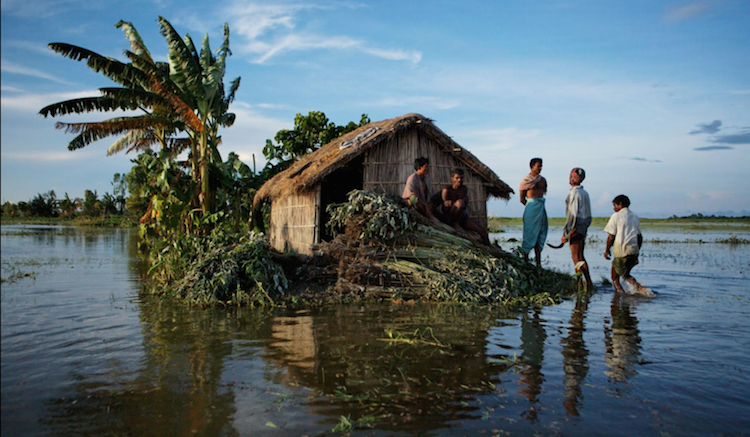“Villagers stand on jute plants surrounding a flooded house in the Gaibandha District of Bangladesh. The country is among the most vulnerable to increased flooding with climate change. “
(PHOTOGRAPH BY JONAS BENDIKSEN, NAT GEO IMAGE COLLECTION)
村民們站在孟加拉國Gaibandha區一座被水淹沒的房屋周圍的黃麻植物上。該國是最易受氣候變化影響的國家之一。 “
(JONAS BENDIKSEN攝影,NAT GEO IMAGE COLLECTION)
CTW is proud to be a part of UNICEF’s water, sanitation and hygiene (WASH) program. WASH works in over 100 countries worldwide. Helping improve water and sanitation services, as well as basic hygiene practices. In times of crisis children are particularly vulnerable.
Climate change poses a new threat to child survival and development. Over the next 10 years it’s predicted climate change will affect 175 million children a year. As a result of threats to water, sanitation and food security.
The effects of climate change are first felt through water. Through droughts, floods and storms. These disasters can destroy water supplies and toilets or contaminate precious water supplies. This puts the lives of millions of children at risk.
Many of the regions most at risk already have very low levels of access to clean water and proper sanitation. And the 60 million children living in these areas are vulnerable. They need access to sustainable water sources and improved sanitation. So that in times of crisis and times of stability, every child gets the chance to survive and grow.
“Clean the World Foundation represents WASH on the UN Global Impact council. Contributing to the design and development of the WASH programs around the world.”
潔世亞洲很榮幸可以參與聯合國兒童基金會WASH計劃的當中。 WASH在全球100多個國家/地區開展業務。幫助改善供水和衛生服務以及基本衛生習慣。在危機時期,兒童特別容易受到傷害。
氣候變化對兒童的生存和發展構成新的威脅。在未來的十年,預計氣候變化每年將影響1.75億兒童,基於對水,環境衛生和糧食安全的威脅。
首先我們通過水感受到氣候變化的影響。乾旱,洪水和風暴,這些天然災害可能會破壞供水和廁所,或者更會污染寶貴的水源。這樣會使數百萬計兒童的生命處於危險之中。
許多風險最高的地區本來已經缺乏清潔水源和沒有適當的衛生設施。生活在這些地區的6,000萬兒童都很脆弱,他們需要獲得可持續的水源和改善衛生條件。不論在危機時期和穩定時期,每個孩子都應該有機會好好生存和成長。
“潔世基金會協力聯合國全球影響委員會。為世界各地的WASH項目的設計和開發做出貢獻。”

